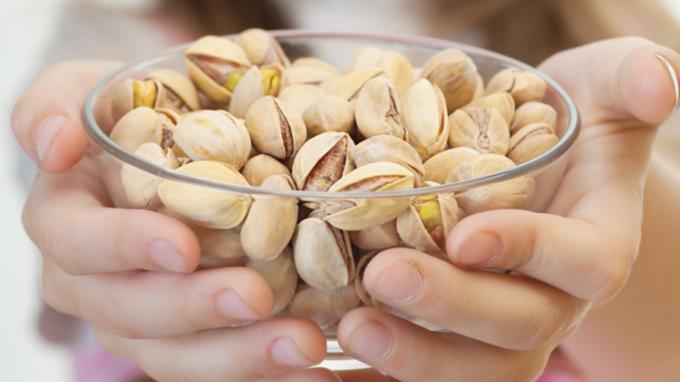Should pregnant women eat pistachios? In fact, pistachios bring many health benefits to pregnant women. However, you should only eat in moderation because if you eat a lot can lead to many dangerous complications.
Pistachios, also known as pistachios, are commonly found in tropical and subtropical regions of Asia, Africa and America. This seed is considered one of the oldest known to man and is thought to have existed around 6,000 BC. To answer the question of whether pregnant women should eat pistachios, please refer to the following information.
The nutritional value of pistachios
Pistachios are a food that provides a lot of energy for the body but contains a low amount of calories and many other essential nutrients. In 30g pistachios contains about 6g protein; 2.8g of fiber; 12.7g of fat.
Effects of pistachios on bodily functions
The nutrients in pistachios help support the following functions:
1. Supports liver and gallbladder function
2. Clean blood vessels
3. Improve vision
4. Slow down aging of cells
5. Prevents neurological disorders, depression and depression .
Types of pistachios
Pistachios are processed by two ways of drying or frying. Deep-fried pistachios often lose some nutrients, but their ability to grow mold is lower than dried pistachios.
Sometimes during processing the producer adds salt. Therefore, if you have health problems related to heart, kidney ... then you should be cautious when eating pistachios.
Should pregnant women eat pistachios?
It is perfectly okay for pregnant women to eat pistachios as long as you eat a moderate amount. If you eat too much, it can cause some side effects. Also eaten properly, pistachios give you many benefits because it contains nutrients such as iron, calcium, folic acid and potassium. These are all essential for the development of the fetus:
Pistachios are a rich source of protein, essential for the development of baby's muscles and tissues.
Monounsaturated fats can raise good cholesterol and lower bad cholesterol.
The presence of antioxidants present in pistachios such as vitamins E, A, carotene and polyphenolic compounds also helps to increase your immunity.
Pistachios contain a lot of copper, which helps to stabilize the number of red blood cells during pregnancy.
Not only that, pistachios also have anti-inflammatory properties, reduce swelling and reduce joint pain during pregnancy.
The high fiber content in pistachios also helps pregnant women limit constipation.
The omega-3 fatty acids in pistachios are good for your baby's brain development.
Pistachios also contain a lot of B vitamins such as vitamins B1, B2, B3, B6 and folic acid, which are important for the development of the fetus.
Besides, pistachios are also very helpful in preventing liver diseases, jaundice and anemia.
How many pistachios should pregnant women eat per day?

Pregnant women should not eat more than 15 pistachios in a day because eating too much can cause excess oils in the body. This can lead to nausea or headaches, and damage to the brain. Also, in pregnant women, eating too much pistachios can lead to premature birth.
Side effects of eating pistachios
Pistachios can cause a number of side effects. Ideally, you should consult your doctor before adding this food to your diet:
Just like other nuts, pistachios contain anacardic acid, a chemical compound that can cause allergies. Therefore, if you are allergic to other nuts then it is likely that you are allergic to pistachios.
Pistachios contain fructans, a type of fiber that can cause common digestive disorders like diarrhea, constipation, bloating, and stomach upset.
You should choose pistachios that do not contain too much salt because salt can raise blood pressure, which is not good during pregnancy.
Pistachios can also cause heat in the body, adversely affecting the health of pregnant mothers.
How to add pistachios to your diet
There are many ways to add pistachios to your daily diet. Here are some helpful tips:
You can use pistachios as a snack or add to dishes to enhance the flavor.
You can mix salad with pistachios to make a nutritious dish.
You can try adding pistachios to yogurt, oatmeal or cereal to make a nutritious breakfast or post-meal dessert.
Try drinking a glass of milk with pistachios, saffron, cardamom and almonds on an empty stomach.
How to choose a pistachio
When you eat, you also need to know how to choose quality products, for example:
No mold, fungus
Has a pleasant fragrance and does not smell strange
And the shell
Light green in color.
Pistachios are a good source of vitamins, trace elements and amino acids useful for pregnant women and their unborn babies. However, you should only eat in moderation. If you have allergies, replace them with other nuts.












